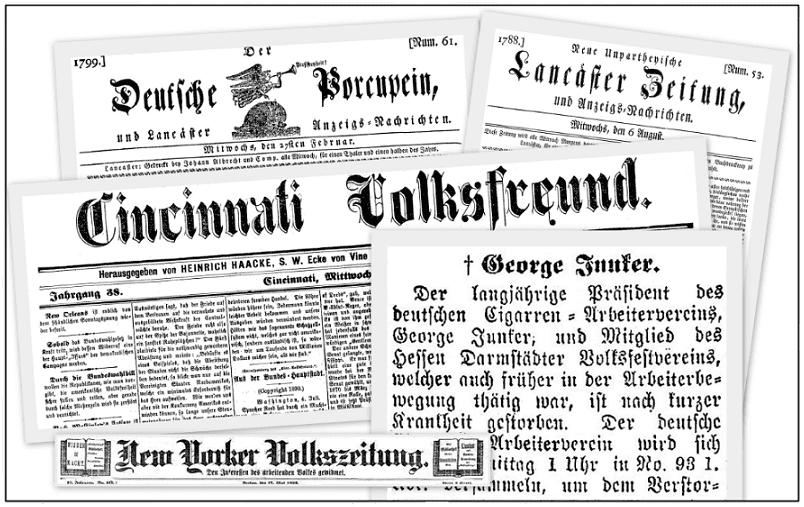Introduction: In this article, Gena Philibert-Ortega gives tips for researching your ancestors in German American newspapers, even if you don’t speak German. Gena is a genealogist and author of the book “From the Family Kitchen.”
Did you know that GenealogyBank’s historical newspaper archives include German-language newspapers printed in the United States? If your German ancestor lived in the U.S., then German-language American newspapers could be an important addition to your research.
From 1840 to 1880 German immigrants made up the largest group of immigrants to the United States. Newspaper publishers met the needs of this immigrant group by publishing German-language newspapers that focused on what this community was interested in. These newspapers provided news from their homeland as well as what was happening locally in the United States. By 1890 there were over 1,000 German-language newspapers in the U.S.* GenealogyBank has 86 German-language American newspapers – the earliest is from 1750!
Reading German-Language Newspapers
German-language newspapers are a great source for genealogists with German ancestors, but you must be able to search and read the corresponding results in German. Don’t read German? No problem! Here are three tips for translating those newspapers:
- Start with a FamilySearch Genealogical Word List. You already know that FamilySearch is the place to go for genealogical records – but it’s also the place for learning more about genealogy. One genealogical tool found on the FamilySearch Research Wiki is their genealogical word lists. These Word Lists help you to familiarize yourself with genealogically relevant words that you then use to search for newspaper articles about your ancestors. See the Wiki article, German Genealogical Word List for keywords in English translated into German. When searching GenealogyBank for common names, consider including German words for genealogical events and familial relationships. More German language assistance can be found on the Wiki page Germany Languages. This page will also help you learn more about reading German script.
- Use Google Translate but with caution. Google Translate is a great addition to your genealogical toolbox but it must be used with caution. Yes, Google Translate does everything from translate individual words to entire web pages. It can even translate text in real time via your cell phone camera. But because Google Translate utilizes machines and not humans to translate, it sometimes gets words and meanings wrong. I recently used the Google Translate app’s camera feature to translate a document, and while I got the gist of what the document was saying the translation wasn’t the best. So, definitely use Google Translate but you may also want to invest in a good German-English dictionary. I would also suggest double checking the translation with someone who reads German. It’s even better if they speak the language as well or have experience with older German records.
- Learn how to read German. I know it’s easy for me to say, but you may want to consider teaching yourself how to read at least some German so that you can recognize genealogically relevant words in German documents. FamilySearch’s Learning Center includes a series of videos on Reading German Handwritten Records which would be a good start for your language education. Of course, you can always hire a German genealogist, or ask someone for help via a translation group on Facebook such as the group Genealogy Translations. However, if you’re going to be doing a lot of German research, it might be worthwhile to invest some time in learning to read German. There are various ways to do this, including purchasing German-language aids online or in print form. One such tool to consider is the German-English Genealogical Dictionary by Ernest Thode.
Have You Looked at the German Newspaper Collection?
You know that newspapers are an important part of your genealogical research, and if you have German ancestors, don’t stop at just searching their local, English-language newspaper. Seek out what German-language American newspapers also existed. These may report news or events not found in your ancestors’ local English-language newspaper.
* “Chronicling America’s Historic German Newspapers and the Growth of the American Ethnic Press,” National Endowment for the Humanities Blog (https://www.neh.gov/divisions/preservation/featured-project/chronicling-americas-historic-german-newspapers-and-the-grow: accessed 17 June 2019).
Related Articles:

